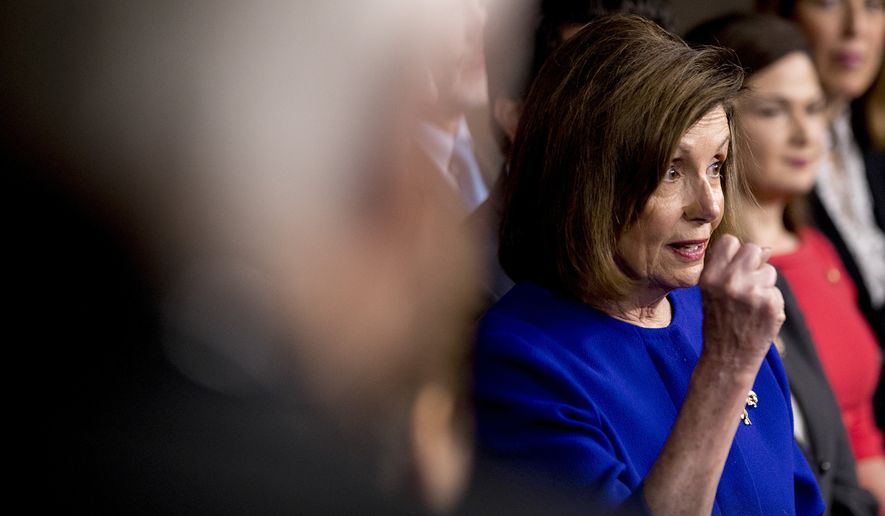House Democrats and Republicans linked arms and overwhelmingly approved President Trump’s rewrite of the North American trade deal Thursday, less than 24 hours after members evoked Pearl Harbor and Pontius Pilate in a nasty impeachment debate on the same floor.
Lawmakers said the lopsided, 385-41 vote to implement the deal felt like whiplash after an impeachment vote that broke mostly along party lines.
“In sharp contrast to yesterday, today is the first time this chamber can finally rally behind an overwhelming, bipartisan legislative win since the beginning of this Congress,” House Minority Leader Kevin McCarthy said.
Senate GOP leaders say they plan to take up the deal after the holidays.
The U.S.-Mexico-Canada Agreement, which opens new markets for farmers and lifts the wage floor for autoworkers, is a major achievement for Mr. Trump.
He pledged to renegotiate trade deals stacked against American workers and brought Mexico and Canada to the table, only to see his revamp of the 1994 North American Free Trade Agreement languish in the Democrat-controlled House.
Mr. Trump accused them of dithering out of hatred, though Democrats said they secured key concessions by holding out, including stiffer environmental standards and requirements that would thwart companies from seeking cheaper labor in Mexico.
House Speaker Nancy Pelosi said Democrats will take credit for the deal because Mr. Trump’s initial offer “did not fit the bill.”
“This isn’t about him. It’s about American workers,” the California Democrat said. “It’s about being good neighbors in our hemisphere. And frankly, we weren’t going to go down that path until the administration conceded on many of the provisions that they had in the original proposal, which were not acceptable.”
Republicans said Democrats didn’t want to give Mr. Trump a win while their committee chairmen investigated him and only approved the deal to minimize political blowback from the articles of impeachment approved Wednesday night.
“Had they not been obsessed with impeaching President Trump, we could have approved this very deal a year ago,” said Rep. Liz Cheney, Wyoming Republican. “And the bipartisan nature of this deal that we are here discussing today cannot cover up what happened on this floor last night.”
Likewise, Mr. Trump’s reelection campaign said it was a “shame” that a “win for workers” took so long.
Most of Thursday’s “no” vote came from Democrats, with 38 rejecting Mr. Trump’s deal compared to two Republicans — Ted Yoho of Florida and Thomas Massie of Kentucky — and one independent, Justin Amash of Michigan.
Rep. Pramila Jayapal, a progressive Democrat from Washington, said the deal still didn’t go far enough.
“I am deeply concerned that jobs in the aerospace industry — critical to our state’s economy — have received insufficient protections,” she said. “Several other large labor unions in the state have also articulated some significant concerns that this deal does not do enough to protect vulnerable and exploited workers and prevent outsourcing of jobs to places with lower labor standards.”
It was the final vote of the year in the House.
The deal, known as USMCA, would prevent Canada from undercutting U.S. dairy farmers on price and require auto manufacturers to use more materials from North American countries. It also streamlines the customs process and includes digital provisions that forbid tariffs on products such as e-books.
Rep. Kevin Brady, Texas Republican, said the agreement will be fully enforceable and help American innovators compete with rising players such as China.
“Yesterday, with impeachment, was a low mark in partisanship,” he said. “In the end, USMCA will not be a Republican win or a Democratic win, but a win for the American people.”
All three North American nations must ratify the deal before it replaces NAFTA as binding policy.
At least one prominent Republican says the USMCA doesn’t improve on the existing deal.
“We’ll get little or no economic growth out of it,” Sen. Pat Toomey, Pennsylvania Republican, told the American Enterprise Institute.
He said the deal was predicated on a trade deficit with Mexico that doesn’t matter economically and will impose new rules that could make automobiles more expensive.
Mrs. Pelosi and labor unions, he said, were able to secure “protectionist” measures that violate the spirit of free trade.
Mr. Toomey said while the deal is slated to pass by large margins in Congress, it shouldn’t serve a template for future agreements.
“We should not be looking to restrict trade,” he said. “We should be looking to expand trade.”
• Tom Howell Jr. can be reached at thowell@washingtontimes.com.




Please read our comment policy before commenting.